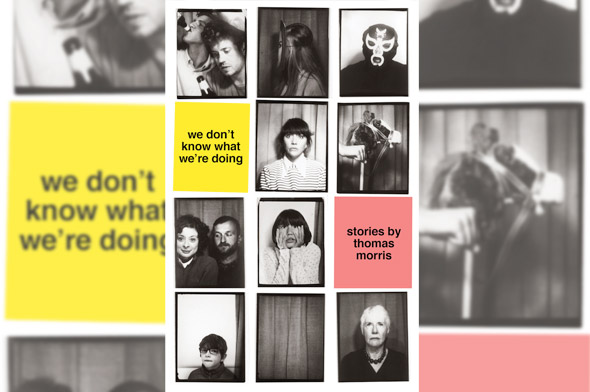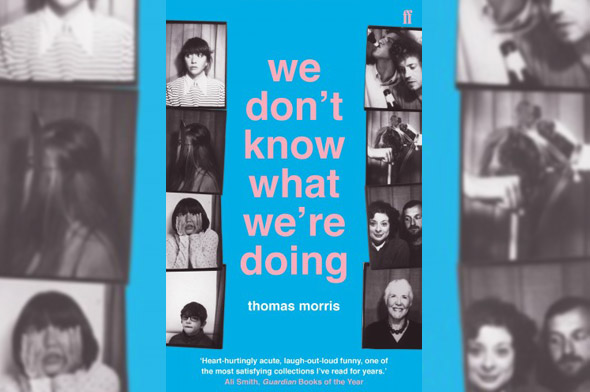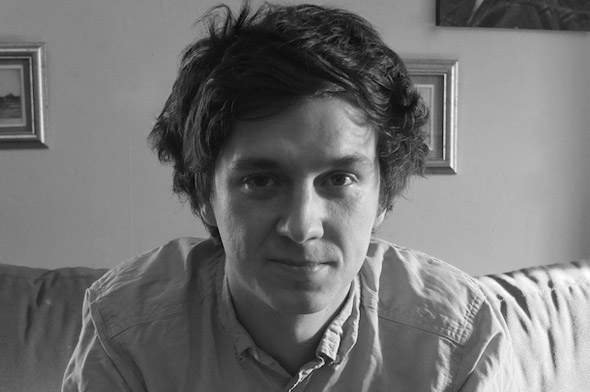Extract: 'Clap Hands'
‘Clap Hands’ from We Don't Know What We're Doing was longlisted for the EFG Sunday Times Short Story Prize.
Because the state will always find new ways to make no sense, Amy couldn’t work more than eighteen hours a week. Well, she could have, but because of the child tax credits, each hour she worked beyond the eighteen was taken back off her in tax. So mornings at the nursery were fine. The rest of her life was a full-time job anyway: her husband had just run off and left her with their three kids; the house was falling apart; her mother was still percolating after her father’s death; and having heroically, majestically, failed the test five times in four years, she still couldn’t drive.
It might sound like we’re piling it on, but this is how life lived in Amy: with spider legs, scuttling in all directions.
*
Afternoons were filled with acute challenges – like dealing with her mother, or driving lessons, or trying not to have a panic attack as she stood in front of the ATM, in that pause between hitting enter and waiting for the chugging of cash drawers to start, a chugging that sometimes felt like it would never begin. One time, when there had been nothing in the account but the solitary beeping of Insufficient Funds, and Amy was panic-reeling, a random man said to her – like it was his own idea, his very own words – ‘Cheer up, it might never happen.’
She studied him – his smug eyes and his smug hair and his smug little smile.
‘Well, you’re wrong,’ she said. ‘It has happened.’
The man stuttered apologies and darted down the road.
So yes, some afternoons were spent taking her shrinking mother to Safeway (having no car meant doing the weekly shop in stages and bits) and other afternoons consisted of accompanying her on the bus to the doctor’s or the hospital or the solicitor’s, or doing endless rounds of washing. Other days were taken up entirely with calls and meetings with the CSA and the DSS and the Citizen’s Advice Bureau and the tax office and Swalec and BT and British Gas and Abbey National – and then doing all this and more for her mother, too.
Amy seemed to spend most of her time sitting on the bottom stair in the hall, the phone resting between her chin and shoulder as she scrawled down the names and numbers of people and departments to call. The twirling of the phone’s curly wire around her fingers – and even the smell of the hall itself – slowly became synonymous with disappointment: it only ever connected her and the house to more problems.
And problems, she learned, did not need an invite.
*
And then, one rainy evening, as Amy was staring at a dark stain on the ceiling, Rhys called down from the bath. When she reached the landing, the door crept open, her son’s quizzical head popped around, and his breaking voice said:
‘There’s mushrooms growing by the toilet.’
And indeed, mushrooms they were! Some kind of fungi spurting out beside the basin of the loo, between the floorboards and the wall. When Amy called the council, they sent a short man with a thick moustache. He brought his own son along, a little boy, seven or eight, wearing glasses and a mini plumber’s outfit – blue overalls, the works. The man put on a pair of see-through gloves, stroked the mushrooms and sighed.
‘Ah yes,’ he said. ‘That’s global warming, that is.’
‘What the hell you on about?’ she said, and the little boy looked up to his dad, as if he wondered the same.
‘Bathrooms get very humid,’ he said. ‘Because the world’s heating up, you see.’
‘You being serious?’ she said.
The man looked at the floor, his brows furrowed. ‘Aww God, mun,’ he sighed. ‘I can’t do this.’ He took off his gloves and lay them on the toolbox.
‘Can’t do what?’ she said.
He sat down on the floor then, with his back against the wall. He scratched his face and rubbed his moustache. He looked as if he was about to cry.
‘I’ll be honest with you, love,’ he said. ‘Me and the boy, we don’t know what we’re doing.’
‘You what?’ she said.
‘We’re not plumbers,’ he said. ‘I’m pretty good round the house, so for some extra money I thought I’d give it a go. But it’s quite clear I’m already out of my depth.’
She rubbed her eyes, took a deep breath, and brought the father and his son downstairs to the living room. She gave the man a cup of tea, and the boy a glass of squash. She made them a ham sandwich each, and sat on the couch as they ate at the table. Neither said a word, and the two stared off into the distance as they chewed, nodding their heads slowly, like they were both thinking their saddest thoughts, the thoughts they’d enter if they had to cry.
‘Well, we’d better be going,’ the man said eventually. ‘Thanks for the tea.’
‘Yeah,’ added the boy. ‘Thanks for the sandwich, too.’








